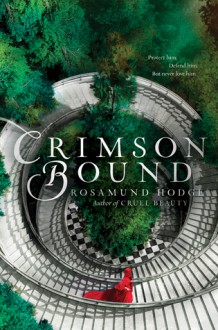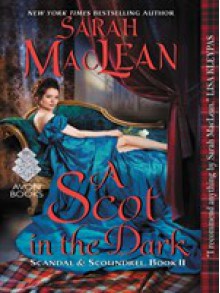
Sibylla "Billie" Bridgerton has always been a tomboy. As a girl, she ran wild with the neighbouring Rokesby children, and it's been long expected that she'll end up marrying either of the younger sons, Edward or Andrew. She's doesn't really mind the idea herself, but marriage is the furthest thing from her mind, even after her best friend, Mary Rokesby goes off to marry her eldest brother George's best friend. After all, if Billie gets married, whose going to oversee the running of the Bridgerton estate? Her brother Edmund is still away at Eton, far too young to take charge. The only Rokesby Billie doesn't really get along with is the heir, George Rokesby, Viscount Kennard. He's always so serious, clearly disapproving of her un-ladylike ways.
So when Billie falls out of a tree, twists her ankle badly and ends up stranded on a deserted cottage roof, having tried to rescue a stray cat, she really wishes that anyone else in the neighbourhood except the supercilious George is the one to come to her rescue. Things do not improve when circumstances cause the ladder he's used to get up on the roof to fall over, stranding them both. While no one in their right mind would think that George Rokesby had compromised Billie Bridgerton on a roof in the middle of the countryside, propriety would demand that the Viscount offer for her hand if they are stranded there for too long. Luckily, Andrew Rokesby, home on leave from the navy with a broken arm, comes along and rescues the two of them, but is very amused by the predicament they've found themselves in. George also insists on chivalrously carrying the wounded Billie back home, and after their little adventure, the two suddenly see each other differently.
As the son and heir, George has never been allowed to go off and see the world. His brother Andrew is in the navy, while Edward is over in the Colonies, scouting in the Revolutionary War. As the eldest, he has always observed his younger siblings and the vivacious eldest Bridgerton daughter run around and cause trouble. Even now, although Billie is universally loved in the neighbourhood, she has a tendency to get into unlikely scrapes, and it annoys George immensely. Almost as much as the thought that she may some day end up marrying one of his brothers. After their little interlude on the roof, George suddenly finds himself very bothered by the idea of Billie marrying anyone...except him. Could he be falling in love with the exasperating Miss Bridgerton?
While most of Julia Quinn's books are set in the Regency era, this new series is set a generation before her most famous Bridgerton books, in the Georgian era, but do in some ways still involve Bridgertons, as the title suggests. Billie Bridgerton is in fact the aunt of all the various Bridgerton siblings, whose father Edmund, Billie's younger brother, never actually appears in the series, except in the heroes and heroine's memories, as he died tragically before his youngest daughter was born. He's only mentioned in passing here, as he's away at school, but it seems likely he may make an appearance in later books. There is certainly another Bridgerton sister to marry off, as well as two Rokesby brothers, one of whom is missing in the Americas in the midst of the Revolutionary war for much of the plot of this book.
I've said in previous reviews that the best Julia Quinn novels don't have overly complicated plots or outside forces trying to get between the lovers. She's really not very good at writing villains. Happily, this is one of the books where the only thing keeping our couple apart is their preconcieved notions of one another and the fact that they've just not realised that they've got their perfect partner a few miles away, on the neighbouring estate. Billie and George just need to forget the impressions they made of each other growing up, and see each other as the adults they've become. Their families are clearly perfectly happy for them to end up together and it's quite sweet how they scheme to throw them together.
I wish I could say that this is Julia Quinn's triumphant return to truly great romance, after her previous years' efforts have mainly been rather forgettable, but I can't. I absolutely enjoyed this book, and appreciated that it didn't feature a lot of complicated drama, just two people learning to see the other in a new light and falling in love. Yet I doubt it's going to be one of the Quinn books that people remember in years to come, and it's certainly not a timeless classic like some of her Bridgerton novels. I don't regret buying it when it came out, but I suspect I will wait until her books are on sale before getting more of them. The next book in the series, involving lost brother Edward, set in Revolutionary era wartime America, will be an interesting departure from her previous books, though, so I imagine I'll be reading it, just to see her do something different.
Judging a book by its cover: There's a lot I like about this cover. The gorgeous green of the gown. The fact that it's only saucily slid off one shoulder rather than all undone in the back with anachronistic lack of undergarments. The cover model's little smirk in the mirror. The crossed fingers behind her back. There's also things I don't like. The cover model is way too old to be a 23-year-old Billie Bridgerton. This book is set in the Georgian era. That is not a period appropriate dress! Great for Regency, wrong for the previous generation.

 Log in with Facebook
Log in with Facebook 









